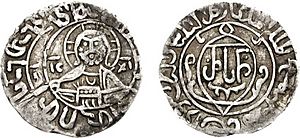Rusudan of Georgia facts for kids
Quick facts for kids Rusudan |
|
|---|---|

Coin of Rusudan, 1230
|
|
| Queen of Georgia (more...) | |
| Reign | 1223–1245 |
| Predecessor | George IV |
| Successor | David VI |
| Born | 1194 |
| Died | 1245 (aged 51) Tbilisi |
| Burial | Svetitskhoveli Cathedral, Mtskheta |
| Spouse | Ghias ad-din |
| Issue | David VI Gurju Khatun |
| Dynasty | Bagrationi |
| Father | David Soslan |
| Mother | Tamar of Georgia |
| Religion | Georgian Orthodox Church |
| Khelrtva |  |
Rusudan (Georgian: რუსუდანი, romanized: rusudani) was a powerful queen who ruled the country of Georgia from 1223 to 1245. She was part of the Bagrationi dynasty, a very old and important family in Georgian history. Rusudan became queen during a challenging time for Georgia, as the country faced many invasions.
Contents
Life as Queen of Georgia
Early Reign and Challenges
Rusudan was born around 1194. She was the daughter of the famous Queen Tamar and David Soslan. When her brother, King George IV, passed away too soon on January 18, 1223, Rusudan became the new ruler. His death marked the end of Georgia's "Golden Age," a time of great power and culture.
Rusudan was known for her beauty. However, she found it difficult to keep the peace and strength that her mother and brother had achieved.
Invasions and Conflicts
In the autumn of 1225, Georgia faced a major threat. An army led by Jalal ad-Din Mingburnu, the ruler of Khwarazm, attacked the country. His army was actually being chased by the powerful Mongols.
The Georgian army suffered a big defeat at the Battle of Garni. Because of this, Queen Rusudan and her royal court had to move to Kutaisi. The capital city, Tbilisi, was then surrounded by Jalal ad-Din's forces.
The Fall of Tbilisi
A year later, on March 9, 1226, Jalal ad-Din captured Tbilisi. The people of the city fought bravely, but over 100,000 lost their lives when the city fell. The invaders ordered the defeated Georgians to change their religion and become Muslims. However, the people refused, and most of Tbilisi's population was tragically killed.
In February 1227, the Georgians saw a chance to fight back. Jalal ad-Din was having trouble in Armenia, so they managed to take Tbilisi back. But they soon had to leave the city again. They even set parts of it on fire themselves during their fight against the occupation.
Rusudan tried to form an alliance with neighboring rulers from the Seljuk states of Rüm and Ahlat. However, the Georgians were defeated by the Khwarazmians at the Battle of Bolnisi in 1228, before their allies could arrive.
The Mongol Era
After the Khwarazmians, an even greater threat appeared: the Mongols. They advanced into Georgia in 1235. Georgia had already been weakened by Jalal ad-Din's attacks, so it surrendered without much resistance. By 1240, the entire country was under Mongol control.
In 1242, Queen Rusudan was forced to accept the rule of the Mongol Khan. This meant Georgia had to pay a large yearly tribute of 50,000 gold pieces. They also had to provide soldiers to support the Mongol army.
Succession and Final Years
Rusudan was worried about who would rule Georgia after her. She feared that her nephew, David, might try to take the throne. To prevent this, she kept him as a prisoner at the court of her son-in-law, Sultan Kaykhusraw II.
Instead, she sent her own son, David, to the Mongol court. Her goal was to get the Mongols to officially recognize him as the next king. Rusudan passed away in 1245, still waiting for her son to return from the Mongol court.
Family Life
In 1224, Queen Rusudan married a Seljuk prince named Ghias ad-Din. He was the grandson of Kilij Arslan II. Before their marriage, he converted to Christianity.
Rusudan and Ghias ad-Din had two children:
- David VI, who later became king.
- A daughter named Tamar. She first married her cousin, Sultan Kaykhusraw II. After his death in 1246, she married Pervane Mu'in al-Din Suleyman as part of a peace agreement.
See also
 In Spanish: Rusudán de Georgia para niños
In Spanish: Rusudán de Georgia para niños

